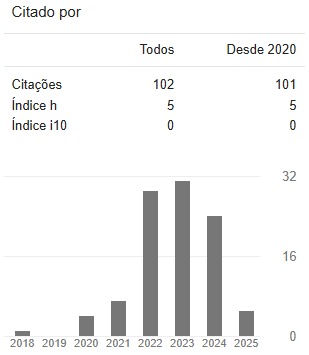A dimensão afetiva na aprendizagem de língua inglesa: estudo de caso em uma escola de idiomas
DOI:
https://doi.org/10.35642/rm.v8i1.1250Palavras-chave:
Formação Docente, Prática Docente, Estudante, Dimensão Afetiva, Língua InglesaResumo
Na prática docente, o componente afetivo, por vezes, não encontra espaço para se expressar, ficando as relações estabelecidas entre professor e estudante limitadas a conexões de ensino e aprendizagem de conteúdos. Assim sendo, o presente trabalho tem por objetivo investigar como a dimensão afetiva se corporifica nas relações estabelecidas entre professores e estudantes na sala de aula de Língua Inglesa em uma escola privada de idiomas em Salvador, Bahia, através dos seguintes elementos: na fala de educadores, no contato físico ou falta dele, na expressão facial e gestual, na escuta, no diálogo ou interação verbal, no gerenciamento e monitoramento de atividades didáticas. Esta pesquisa trata-se de um estudo de caso, e para sua realização foram feitas observações de aulas e entrevistas a cinco professores e dois coordenadores pedagógicos em uma escola de idiomas da cidade de Salvador, Bahia. Este estudo é um convite a todos interessados em refletir sobre a formação docente em uma perspectiva menos tecnicista e mais afetiva, visto que, acreditamos ser a afetividade um diferencial no processo de ensino e aprendizagem. Constatamos que a afetividade expressa por educadores e coordenadores nas relações entre eles e educandos não é fruto de uma formação acadêmica estruturada e sistemática, mas sim de uma formação não formal, demonstrando a necessidade de ampliarmos essas discussões e aprendizagens dentro da formação inicial e continuada em vias de promover uma educação emancipadora e de efetiva aprendizagem.
Downloads
Referências
ALMEIDA, Ana R. S. A emoção na sala de aula. 2ª edição, Campinas: Papirus, 1999.
ALVES, Rubem. Conversas sobre educação. 7ª edição, Campinas, São Paulo: Versus, 2003.
ALVES, Rubem. Receita para se comer queijo. In: ALVES, Rubem. Ao professor com meu carinho. Campinas: Verus Editora, 2004.
ARANTES, Valéria Amorim. Afetividade e cognição: Rompendo a dicotomia na educação. In: OLIVEIRA, Marta Kohl; TRENTO, Denise Rebello de Souza.; REGO, Tereza Cristina. (org.). Psicologia, educação e as temáticas da vida contemporânea. São Paulo: Moderna, 2002.
FREIRE, Paulo. Pedagogia da autonomia: saberes necessários à prática educativa. 20ª edição. São Paulo: Paz e Terra, 1996.
FREIRE, Paulo. Professora sim, tia não: cartas a quem ousa ensinar. São Paulo: Paz e Terra, 2021.
HOUAISS, Antônio. Dicionário eletrônico Houaiss da língua portuguesa. Ed. Objetiva, 2001.
KRASHEN, Stephen. Principles and practices in second language acquisition. 1a edição. Pergamon Press, 1982.
LÜDKE, Menga; ANDRÉ, Marli. Pesquisa em educação: abordagens qualitativas. S. Paulo: EPU, 1986.
LUCKESI Cipriano Carlos. Educação e Ludicidade. In: LUCKESI, Cipriano Carlos (org.) Ludopedagogia, ensaios 1. UFBA/FACED/ Programa de pós-graduação em educação, p.81-97 V. 01, 2000.
MORAIS, Regis de. O que é ensinar. São Paulo: EPU, 1996.
MORALES, Pedro. A relação professor aluno. O que é, Como se faz. São Paulo: Loyola, 2004.
PAIVA, Mirella Lopez Martini Fernandes; PRETTE, Zilda Aparecida Pereira Del. Crenças docentes e implicações para o processo de ensino-aprendizagem. Revista Semestral da Associação Brasileira de Psicologia Escolar e Educacional (ABRAPEE), v. 13, n. 1, p. 75-85, jan.-jun. 2009. Disponível em http://pepsic.bvsalud.org/pdf/pee/v13n1/v13n1a09.pdf. Acesso em: 08 jun. 2024. DOI: https://doi.org/10.1590/S1413-85572009000100009
PIAGET, Jean. Inteligencia y Afectividad. Buenos Aires: Aique, 2001.
RODRIGUES, Moacir Carlos Nunes. A importância da afetividade na aprendizagem escolar na relação aluno-professor. Revista Multidisciplinar Infinitum, p. 109-123, 2019. Disponível em: https://periodicoseletronicos.ufma.br/index.php/infinitum/article/view/12060. Acesso em: 30 mai. 2024.
SALTINI, Claudio J. P. Afetividade e inteligência. 6ª ed. Rio de Janeiro: Wak, 2022.
VYGOTSKY, Lev Semenovich. A formação social da mente. São Paulo: Livraria Martins Fontes Editora Ltda, 1998.
WALLON, Henri. A evolução psicológica da criança. Lisboa: Edições 70, 1968
Downloads
Publicado
Edição
Seção
Licença
Copyright (c) 2024 Revista Macambira

Este trabalho está licenciado sob uma licença Creative Commons Attribution 4.0 International License.












